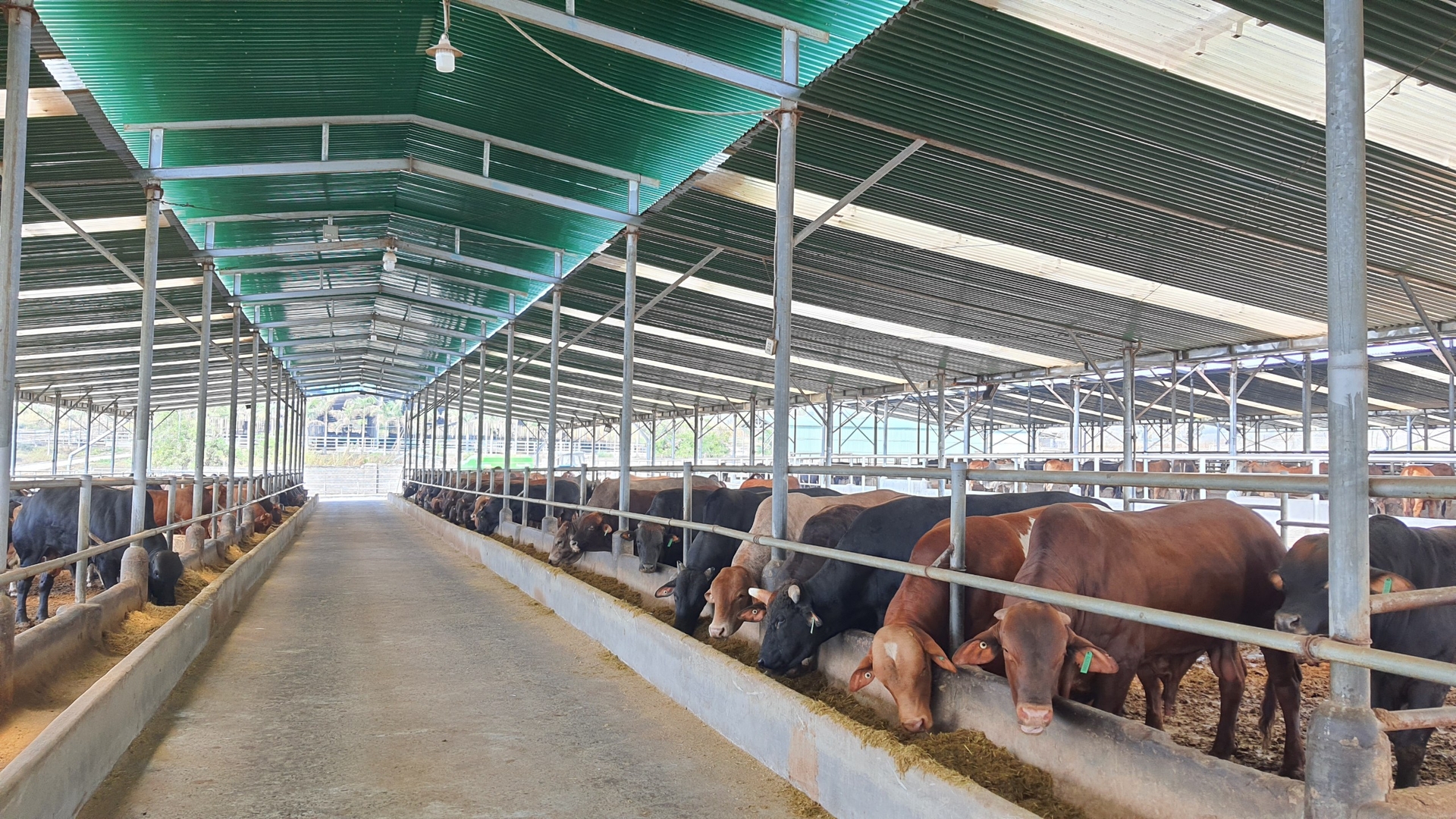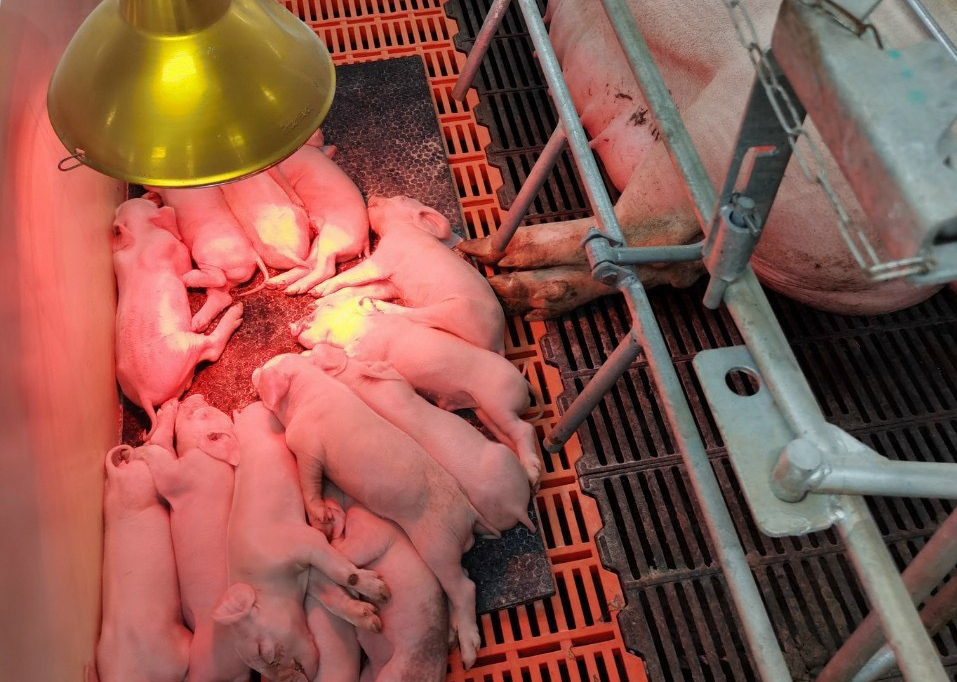November 21, 2025 | 06:39 GMT +7
November 21, 2025 | 06:39 GMT +7
Hotline: 0913.378.918
November 21, 2025 | 06:39 GMT +7
Hotline: 0913.378.918
Mr. Tran Ngoc Son, Deputy Director in charge of the Dak Lak Department of Animal Husbandry and Veterinary Medicine, said that Dak Lak is a province with one of the top animal husbandry scales in the country.
Specifically, the buffalo and cow herd is in the top 9; the poultry herd is about 13.6 million heads, ranking in the top 7; and the pig herd is currently about 960,000 heads, in the top 5 out of 63 provinces and cities.

Dak Lak is a province with one of the top husbandry scales in the country. Photo: Hong Tham.
Dak Lak has been determined to be a pioneer province in developing livestock production towards building disease-free facilities and zones.
Dak Lak Provincial Party Committee has issued a Resolution on the livestock development program for 2020 - 2030, with an orientation to 2045.
On that basis, the People's Committee of Dak Lak province also issued Plan 1199 to develop livestock production according to the Government's livestock development program.
"Currently, Dak Lak has built more than 40 disease-free livestock facilities and is building a safe area in Cu Mgar district. We determine that building disease-free livestock facilities and areas is an inevitable immediate and long-term direction for the Dak Lak livestock industry to ensure efficiency and sustainability in the increasingly growing trend, deeply integrating with the world," Mr. Son added.
Mr. Tran Ngoc Son expressed concern that the Central Highlands provinces and Dak Lak have chosen the right direction, but what must be done to become the center of biosafety and epidemic-safe livestock farming?
According to Mr. Son, there needs to be synchronization of the apparatus according to the Veterinary Law, legal documents, and the direction of the Government. To perform well according to the Veterinary Law, the staffing of civil servants and public employees must ensure that they meet task requirements.
Besides, livestock enterprises investing in Dak Lak have enjoyed relatively preferential policies, especially land rent exemption and reduction policies. However, land funds for livestock development are facing difficulties.
Land in Dak Lak, especially in remote communes, is mostly agricultural. According to the 2007 planning of the People's Committee of Dak Lak province, areas originating from forest land are challenging to convert. This issue still has many problems and needs to be re-planned and approved by the Central Government.

Regarding the construction of disease-free livestock facilities, businesses have met the requirements, while farming households still face many difficulties. Photo: Hong Tham.
In addition, for the construction of epidemic-safe livestock facilities and areas, businesses have responded. However, there are still many difficulties for small livestock and farming households, although the Provincial Party Committee Dak Lak has Program No.13 to develop the collective economy. The Government has also issued Decree 98 on supporting businesses, organizations, and individuals participating in livestock production activities...
“Dak Lak is a province where small households raise the majority of livestock, but this livestock farming still contributes to ensuring people's income and social security. Therefore, we must determine that this is a historical issue.
Vietnam is transitioning from a country with a low average income to a high average income level, so we must be synchronous, have policies to support small-scale livestock farming, and bring them into cooperatives and cooperative groups to raise small livestock but not odd if you stand in an organization, the efficiency will be better," Mr. Son emphasized.
In a context where animal diseases are at risk of recurring, replicating biosafety livestock models plays an essential role in the livestock industry. This model also benefits farmers by saving costs, improving production efficiency, protecting livestock, and contributing to reducing environmental pollution.
Biosecurity in livestock farming is measures that include techniques and management of livestock herds to prevent and limit the spread of biological factors of natural or human origin that harm the health and safety of humans, pets and the surrounding environment.
Mr. Tran Ngoc Son, Deputy Director in charge of the Dak Lak Department of Livestock and Veterinary Medicine, said that the Dak Lak livestock industry still has shortcomings that must be resolved to develop effectively, sustainably, safely and effectively to ensure a circular economy; In which the key issues are mechanisms and policies.
Translated by Tuan Huy

(VAN) The information was shared at the seminar 'Urban Agriculture - Solutions for Developing Green Spaces,' organized by the Kinh te & Do thi Newspaper and the Biotechnology Center of Ho Chi Minh City.
/2025/11/19/4141-2-132831_216.jpg)
(VAN) One of Japfa's outstanding solutions is implementing digital transformation and artificial intelligence (AI) to optimize operations, enhance productivity, and advance sustainable development.
/2025/11/19/4847-1-093540_448.jpg)
(VAN) The Gia Lai Provincial People’s Committee had a working session with the delegation of the U.S. Department of Agriculture, the State of Idaho, and representatives of the State's leading enterprises.

(VAN) Ca Mau has a sufficient foundation to become a strong regional aquaculture center, where production integrates the economy, the environment, and the lives of the people.

(VAN) SEIKI Group envisions itself as a pioneer in the ‘dual transformation’ of digital technology and green industry, standing alongside the Government and Vietnamese businesses in their pursuit of sustainable development.

(VAN) The VNGEONET network affirms Viet Nam's progress in mastering digital space, providing a precise positioning data platform to serve socioeconomic development.
/2025/11/14/3247-1-184556_35.jpg)
(VAN) Thai Nguyen is methodically implementing digital transformation in the livestock sector, laying the foundation for a modern, transparent, and sustainable agriculture.